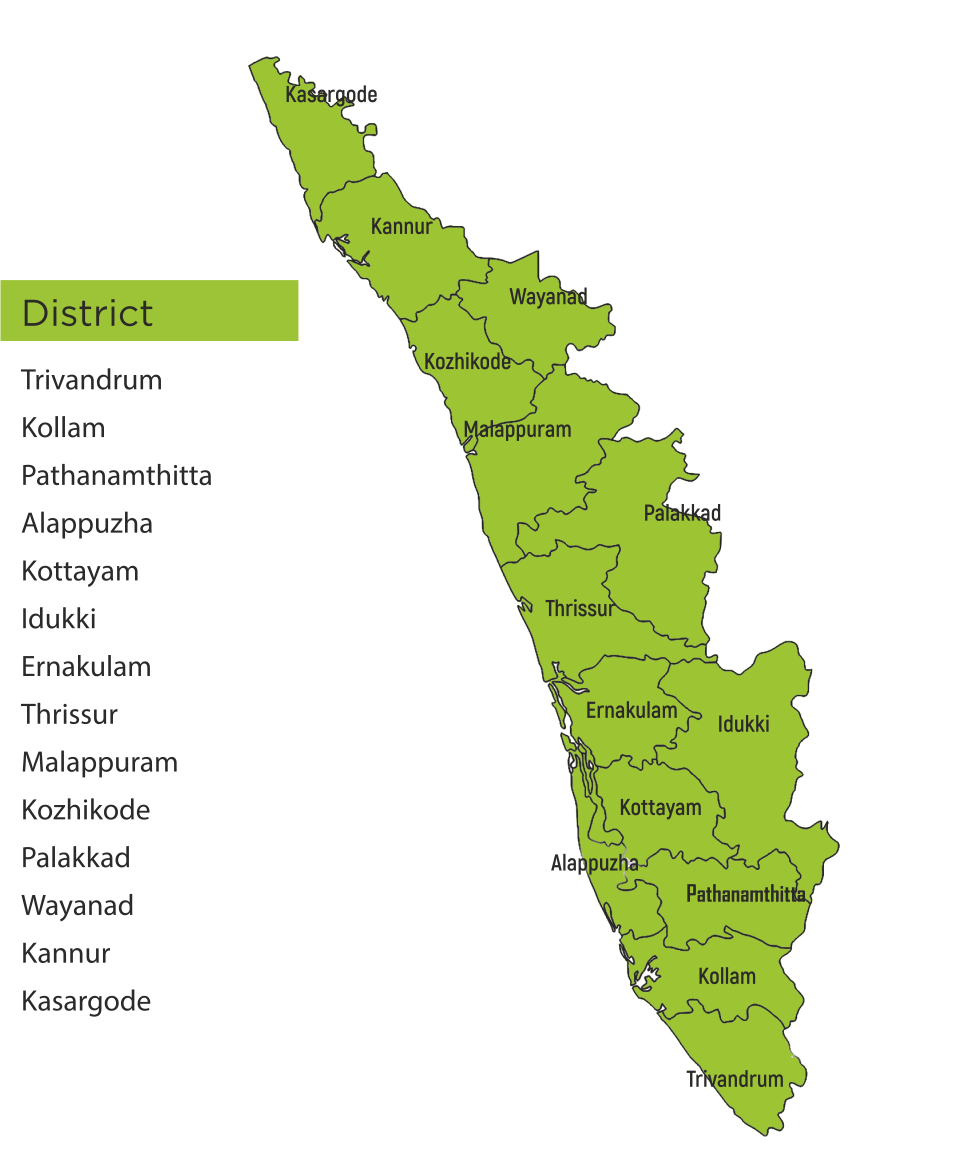Background
Kerala, located in the southernmost tip of the Indian union, is a narrow coastal strip surrounded by the Western Ghats in the east and Arabian Sea on the west. The state of Kerala which was created on 1st of November 1956 following the States Reorganization Act, has a total area of 38,852 km² and forms just 1.18% of India’s total land mass. With respect to the population the state stands in the thirteenth place with 33,387,677 as per the 2011 census and is ranked as the third most densely populated state with a density of 860 persons per sq.km. The total SC population according to 2011 census is 30,39,573 which is 9.1% of the total population of the state. Out of the total SC population, 18,18,281 reside in rural areas and 12,21,292 reside in urban areas. According to the 2011 census, the state has 4,84,839 ST population, which is about 1.45 % of the total state’s population. Out of the total ST population, 4,33,092 reside in rural areas and 51,747 reside in urban areas. The state has a literacy rate of 93.91%, acording to the 2011 census. Kudumbashree Mission the State Rural Livelihood Mission of Kerala which was set up in the year 1998, has been implementing various social, economic and women empowerment initiatives in the state for the poor.
SVEP
Kudumbashree NRO is implementing the project with support from Kudumbashree District Missions in Kerala. Two blocks in Kerala were approved by the Empowered Committee of NRLM for the implementation of SVEP in 2016. Parakode block in Pathanamthitta district and Vadavucode block in Ernakulam district were the blocks approved for Kerala. Detailed Project Reports (DPRs) were finalized in November 2016, after field surveys assessing household demand and existing local enterprise conditions to identify the opportunities for enterprise development in the blocks. The period of implementation of SVEP in these two blocks in from 1st December, 2016 to 30th November, 2020.

30 Micro Enterprise Consultants (MECs) in these two blocks have been trained in modules developed by Kudumbashree NRO over four months. The MECs were trained in two modules - Training in Entrepreneur Development (TED) and Training in Enterprise Administration and Management (TEAM). These MECs have supported almost 500 enterprises by the end of 2017. Since SVEP is a community-driven project implemented at the block-level as per NRLM directives, it was necessary to form a community organization at the block-level. In Parakkode and Vadavucode, a Block Nodal Societies for Enterprise Promotion (BNSs-EP) has been formed with CDS representatives to own the Block Resource Centre for Enterprise Promotion (BRC-EP).
The Empowered Committee of NRLM had approved 12 more blocks in the remaining 12 districts for SVEP implementation in 2017. The approved blocks are: Vamanapuram (Thiruvananthapuram), Pathanapuram (Kollam), Thykattussery (Alappuzha), Vaikom (Kottayam), Idukki (Idukki), Kodakara (Thrissur), Peramba (Kozhikode), Nenmara (Palakkad), Nilambur (Malappuram), Panamaram (Wayanad), Kuthuparamba (Kannur), and Nileshwaram (Kasargode). Micro Enterprise Consultants were selected through a standardized selection process by the respective District Missions in these blocks in September, 2017. The MECs were engaged in the data collection process for the preparation of Detailed Project Reports (DPRs) about each block before actual enterprise development processes are put in place. Mentors from Kudumbashree NRO who have experience in guiding enterprise development as part of MEC Project and SVEP in other states were engaged in each block to support the process. Block Programme Managers (SVEP) were also appointed in each block to provide logistical and administrative support.
As part of the DPR preparation process, an enterprise census was conducted to cover all the enterprises in each block. A sample household survey and a sample enterprise survey were conducted to calculate the demand-supply gap in the block for the purpose of arriving at potential number of enterprises to be supported under SVEP. Focussed group discussions were also conducted, supported by District Missions, with representatives from the NHG federations at the Panchayat level to understand potential areas of enterprise development in the block. Data from various government sources were also collected as part of the field level data collection process for DPR. The field level data collection was completed in all blocks by the end of November, 2017. The DPRs were submitted for approval to NRLM in December, 2017 and was approved by the Empowered Committee in January, 2018. The selected MECs are currently undergoing training in TED and TEAM modules in these 12 blocks by Master Trainers who have been selected and trained by Kudumbashree NRO.
SVEP project status in Kerala as of June 2020
|
No. of Blocks |
03 |
|
No. of CRP-EP/MECs trained |
329 |
|
Number of Mentors Deployed |
03 |
|
Number of BAPs deployed |
01 |
|
Number of Professional |
01 |
|
Block |
Target no. of enterprises by March 2020 |
Achievement till March 2020 |
|
Thykattussery |
649 |
551 |
|
Vaduvukode |
1,478 |
1,485 |
|
Idukki |
794 |
708 |
|
Kuthuparamba |
1,115 |
727 |
|
Nileshwaram |
691 |
703 |
|
Pathanapuram |
955 |
870 |
|
Vaikom |
772 |
710 |
|
Perambra |
669 |
540 |
|
Nilambur |
1,058 |
1,083 |
|
Nenmara |
856 |
498 |
|
Parakode |
1,610 |
1,295 |
|
Vamanapuram |
948 |
772 |
|
Kodakarra |
829 |
702 |
|
Panamaram |
565 |
569 |